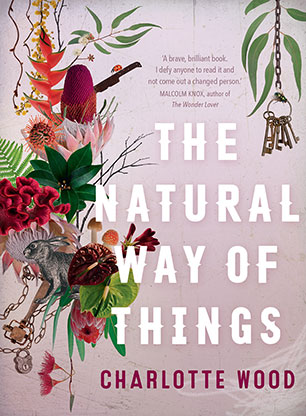Henry James created characters able to embody his concern for elegance, intelligence, morality, and social ritual; and his work attains intellectual and spiritual dimension of a high degree—and his style, thoughtful, textured, teasing, can be complex to the point of profound obscurity, requiring attention, consideration, and deep understanding. The drama is increased for all that.
Category: Literary Fiction Reviews
A review of The Natural Way of Things by Charlotte Wood
 The Natural Way of Things is an easy book to read but a hard one to digest. It holds up a mirror that shows an ugly reflection of the relationship between capitalism and misogyny that once glimpsed cannot be unseen. Though it’s disturbing, The Natural Way of Things is also powerful, beautiful, and utterly important.
The Natural Way of Things is an easy book to read but a hard one to digest. It holds up a mirror that shows an ugly reflection of the relationship between capitalism and misogyny that once glimpsed cannot be unseen. Though it’s disturbing, The Natural Way of Things is also powerful, beautiful, and utterly important.
A review of The Book of Speculation by Erika Swyler
 However, this is a book that once opened cannot be put down till the last satisfying page. Erika Swylers elegant style shines through in a way that will leave the reader longing for the release of her second novel. If it is anything like this one, Erika is destined for the best-seller lists.
However, this is a book that once opened cannot be put down till the last satisfying page. Erika Swylers elegant style shines through in a way that will leave the reader longing for the release of her second novel. If it is anything like this one, Erika is destined for the best-seller lists.
Tim Elliott on Farewell to the Father
Tim Elliott joins us to read from and talk about his memoir Farewell to the Father. He discusses how the initial article and book came about, the reasons for its powerful impact on readers, the themes that underlie the book…
Joel Deane on Year of the Wasp
Joel Deane reads from and talks about his new poetry book Year of the Wasp. Joel discusses a number of the themes and motifs throughout the book and in individual poems, the way the book came together, the power of poetry in getting to the…
Hazel Smith on Word Migrants
Poet, performer, professor and new media artist Hazel Smith drops by to read from and talk about her latest book of poetry Word Migrants. Hazel is an incredible reader and her readings alone are worth listening to, but she also…
A review of The Arrival of Missives by Aliya Whiteley
 The Arrival of Missives is an immensely readable book. It contains delightfully light characterizations in which people are encapsulated by a phrase, a tone of voice, a gesture. And, towards the end of the novel, intentionally or not (what does it matter?), there is an image straight out of Hamlet that provides beauty and horror in equal measure.
The Arrival of Missives is an immensely readable book. It contains delightfully light characterizations in which people are encapsulated by a phrase, a tone of voice, a gesture. And, towards the end of the novel, intentionally or not (what does it matter?), there is an image straight out of Hamlet that provides beauty and horror in equal measure.
A review of My Name is Lucy Barton by Elizabeth Strout

Jane Caro talks about Plain-Speaking Jane
Author, novelist, journalist, broadcaster, columnist, advertising writer and social commentator Jane Caro, chats about her memoir Plain-Speaking Jane, about the power of plain speaking – not just in terms of being candid, but in terms of breaking silence and comunicating…
Vivian Gornick reads from and talks about The Odd Woman and the City
In this special “on location” Sydney Writers Festival show, Vivian Gornick reads from and talks about the writing of her latest book The Odd Woman and the City, about the nature (and freedom) of “oddness”, about the joy and vitality…